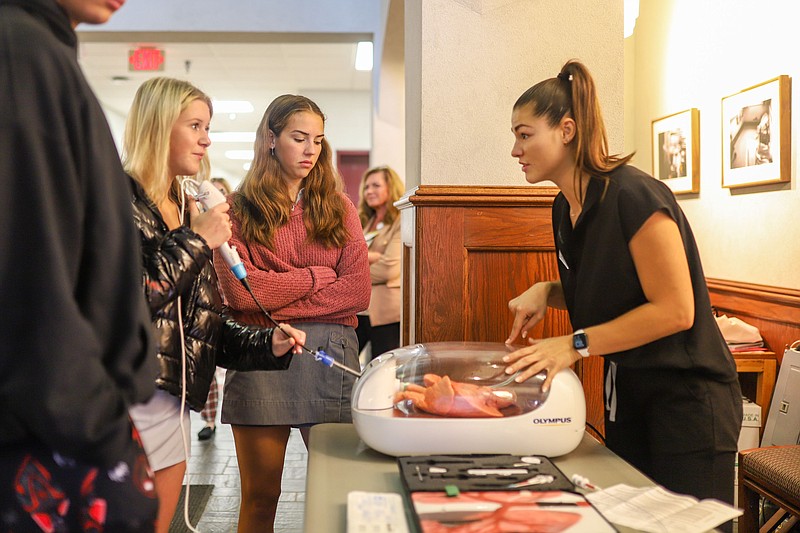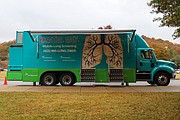Nearly 150 students in Baylor School's scientific research program got to play doctor for Halloween by learning the steps of lung cancer screening, diagnosis and treatment on Monday.
Dr. Rob Headrick, chief of thoracic surgery at CHI Memorial and a Baylor alumnus, helped guide the students and said the event was part of an effort to show them how their various classes in science and math can be applied to future careers.
Another goal, Headrick said, was to teach students that Tennessee has an especially high rate of lung cancer -- which kills more people annually than any other cancer -- and encourage them to use their talents to improve lung cancer treatment and survival rates in the state.
"We're challenging these same kids to go solve the next problem in lung cancer, and there's so many different pathways -- from the engineering component, to the physician component, to the business side of health care," he said. "The future is really bright. There's a lot of hope surrounding the disease. We just have to stimulate this next generation to do it."
Abby Murchison, a junior on the biomedical research track at Baylor, has her eyes set on attending medical school and said Monday's event was interesting not just from an academic perspective but on a personal level, because her grandfather was one of Headrick's former lung cancer patients.
"It's interesting to see all the innovations that are out there right now and see what we might be able to do in the future," Murchison said, adding that her favorite part of the day was getting to experiment using the same tools as surgeons.
Jackson Rogers, a senior on the engineering research track, said he has no plans to become a physician but that Monday helped him see how engineering is applicable to the medical field. Rogers is building a robot for his senior project and said that getting to test out the lung biopsy robot was the highlight of the day for him.
"They had a fake lung in front of us, and we could drive the biopsy robot through the lung," he said. "They set up a GPS to find the cancer cell, and you would follow through with the simulation -- it was really cool to be able to drive that."
John Schepens, a senior on the environmental research track, is studying environmental stressors on amphibians and said he enjoyed getting to tour the mobile lung screening bus, which houses a CT scanner, as well as handle equipment usually only available to medical professionals -- not high school students.
(READ MORE: White House taps Chattanooga lung screening bus in goal to cut cancer deaths in half)
"Doctors deal with stressors on humans, like diseases, and so getting to hear about their experiences is intriguing as I go into the career field, into college and kind of seeing what opportunities lie ahead and where I can apply my interests," Schepens said.
Students also got to see the artificial intelligence technology that enables radiologists to more quickly and accurately diagnose lung cancer, in addition to many other ailments, as well as view a pathology sample of a lung cancer biopsy through a microscope.
Headrick said that lung cancer treatment will look very different by the time the students are into their careers, but that advancement is dependent upon bright minds coming together to fuel innovation.
"I challenged them the same that others challenged me," he said. "Do your best -- the point of your parents putting you in school and going through this process is to learn something, contribute to society, and I'm really encouraging them to come back to Chattanooga."
Contact Elizabeth Fite at efite@timesfreepress.com or 423-757-6673. Follow her on Twitter @ecfite.

